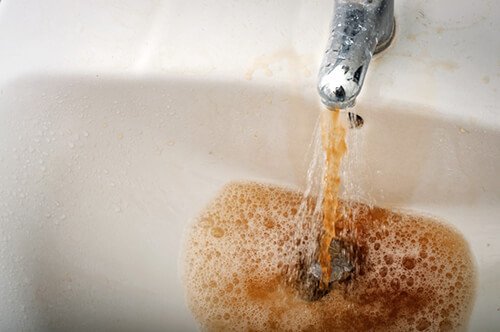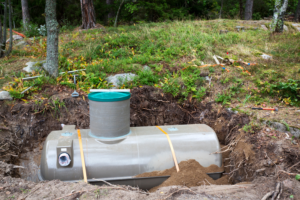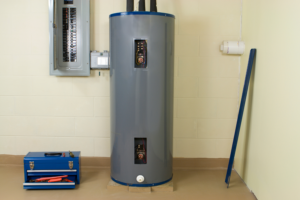 Access to water in the U.S. couldn’t be easier, you wake up, make coffee, jump in the shower, brush your teeth and turn on the dishwater on your way out the door. The EPA estimates that, “The average American family uses more than 300 gallons of water per day at home, and that, “roughly 70 percent of this use occurs indoors.” So when you’re greeted with brown water coming from your faucets first thing in the morning, it’s a cause for some concern.
Access to water in the U.S. couldn’t be easier, you wake up, make coffee, jump in the shower, brush your teeth and turn on the dishwater on your way out the door. The EPA estimates that, “The average American family uses more than 300 gallons of water per day at home, and that, “roughly 70 percent of this use occurs indoors.” So when you’re greeted with brown water coming from your faucets first thing in the morning, it’s a cause for some concern.
Sometimes brown water in your home’s water supply can be linked to:
- Burst water mains in your municipal system
- Water main repairs in your municipal system
- Extensive use of water by the fire department
- Redirecting water supplies to meet the demands of your municipal water system
- Too much iron and/or manganese in the water
- A rusty pipe
Basically, any disturbance of sediment in water pipes can cause light brown to dark brown particles appearing in your water.
What Are These Particles?
As cast iron plumbing pipes age, iron and manganese from rusting pipes settle in the water supply. Excessive use of or recent repairs to municipal pipes stir up sediment and send it your way. While rusty water isn’t harmful to shower in or brush your teeth with, it can discolor dishes and laundry.
How Do I Get Rid Of Brown Water?
First, check around to see if neighbors are having a brown water day. If other homes are affected, here’s what you do:
- Either turn on the faucets in your home for about 20 minutes to try flushing your water pipes.
- Or, hook up a garden hose to your outdoor spigot closest to your water main, probably in your front yard. Water your landscape plants for about 20 minutes to flush the system.
- After 20 minutes, if the water doesn’t run clear, repeat either process.
What If My Neighbor’s Water Is Clear And My Water Is Brown?
If brown water is coming from your hot water taps only, it may be rust and sediment in your water heater acting up. Water heaters usually have a lifespan of 10 to 15 years. If your water heater falls somewhere in this range, and your hot water comes out brown often, it may be time to replace it.
Water heater manufacturers recommend flushing your water heater once a year to extend the life of your water heater by cleaning out sediment and rust. Replacing your water heater can be an unexpected expense and may require the services of a professional plumber to install.
If rusty, brown water is coming from your cold-water taps as well, a deteriorating pipe in your home plumbing system is likely the source of your problem. If you are experiencing a small amount of rust, you may be able to live with it for a little while, but rust in pipes can cause clogs in your plumbing, creating breeding grounds for bacteria and illnesses. Replacing or repairing a deteriorating pipe is your best option in the long run.
Damaged Or Broken Pipes Should Be Addressed Immediately
Determining the location of the rusted pipe can be a frustrating task and repairing or replacing pipes yourself, an expensive nightmare.
Contact a professional plumber, like FloHawks. Through today’s technology, skilled plumbing professionals can perform a video inspection of your plumbing system to locate and determine the condition of deteriorating and corroded pipes.
In newer homes, pipes made from polymer materials are replacing metal pipes. However, in older homes, cast iron pipes eventually wear out and need to be repaired or replaced. It might be a major home improvement project, but one that needs to be addressed before the pipe breaks and causes extensive damage to your home.
FloHawks technicians are on hand to help with all of your plumbing and septic system problems 24/7 including nights, weekends, holidays and for emergencies. Call to schedule an inspection at 1-800-356-4295 or schedule an appointment online.











